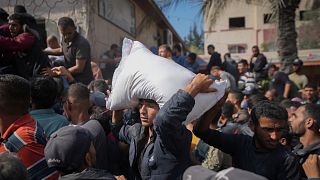Health
About half the world's population lives without any social protection, even though the pandemic has forced countries to better protect their people, the International Labor Organization said Wednesday.
This first report since 2017 by the ILO on the state of social protection in the world shows that 4.1 billion people remain completely without such protection.
Social protection includes access to health care, as well as financial support during retirement and in cases of unemployment, illness, disability, work-related injury, maternity, etc.
In 2020, only 46.9% of the world's population had at least one social protection benefit, while 53.1% had no income guarantee from their national social protection system.
The global percentages mask significant disparities between and within regions: while coverage is above the global average in Europe and Central Asia (83.9%) and the Americas (64.3%), it is below in Asia and the Pacific (44.1%), the Arab States (40%), and Africa (17.4%).
Public spending on social protection also varies considerably. On average, countries spend 12.8 percent of their gross domestic product (GDP) on social protection, while high-income countries spend 16.4 percent of their GDP on social protection and low-income countries only 1.1 percent.
"Glimmer of optimism"
While the pandemic has provided a kind of "X-ray" of global inequality, it has also "revealed the absolutely crucial role that social protection has played in the response" of governments to the crisis, ILO Director-General Guy Ryder said at the report's presentation.
Although to varying degrees, many countries have indeed adopted social protection measures on an unprecedented scale to address the health crisis. "There are glimmers of optimism amidst the devastation caused by the pandemic," Ryder enthused in the report.
"Countries are at a crossroads. This is a critical time to use the response to the pandemic to build a new generation of social protection rights systems," he warned.
The ILO is calling on leaders to continue the efforts made during the pandemic, despite the enormous pressure for countries to embrace fiscal consolidation, and is asking that the social protection measures put in place be maintained until the recovery is well underway.
For while the pandemic has pushed countries to invest in social protection, Covid-19 - which brought the global economy to a standstill for a time - also risks reducing progress on poverty reduction.
The report says that the financing gap - the additional spending needed to provide at least a minimum level of social protection for all - has increased by about 30% since the start of the health Gross Domestic Product (GDP) caused by the crisis.
To ensure at least basic social protection coverage, low-income countries would need to invest an additional $77.9 billion per year, lower-middle-income countries an additional $362.9 billion and upper-middle-income countries an additional $750.8 billion per year. This is equivalent to 15.9%, 5.1% and 3.1% of their GDP, respectively, according to the ILO.












Go to video
Immunization at risk: Global health leaders urge action amid rising disease outbreaks
01:06
UN warns of deepening Haiti crisis
Go to video
Nigeria's market doctors bring healthcare directly to traders
Go to video
Nigerian Football Federation guilty of negligence in footballer's death
Go to video
Libyan leaders call for an inclusive political process
Go to video
South Sudan: top UN official in the country warns of risk of new civil war